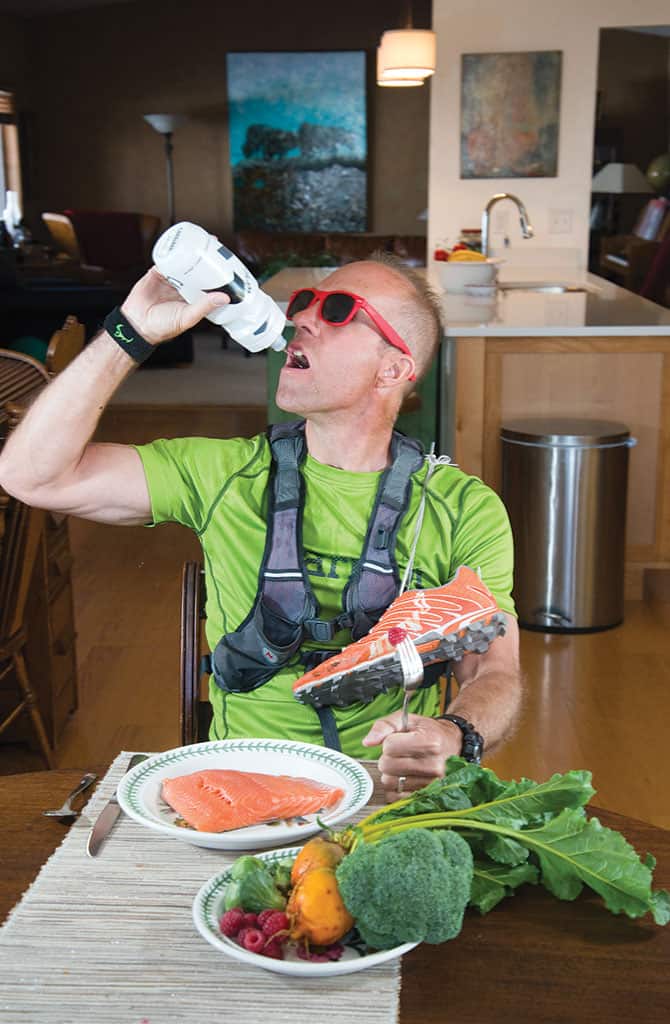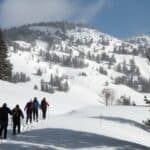Read The
Current Issue
Peak Eating
When it comes to fueling Jackson’s elite athletes, real food trumps all.
BY Rachel walker
photography by bradly j. boner

IF YOU WANT to bike, ski, climb, and run as strong as local elite athletes, know this: it’s not just about training your body. Reaching optimal athleticism requires an optimal diet balanced with carbohydrates, proteins, fat, and liquids. That’s the easy part. Discovering the right balance for your sport, body type, and intensity is tougher—unless you follow the lead of these five successful local athletes. While their choices vary, each subscribes to a relatively simple philosophy made popular in recent years by food journalist Michael Pollan and endorsed by myriad sports medicine professionals and nutritionists: eat real food, not too much, mostly plants.
“A performance-driven diet is the same as a health-driven diet: whole food, real food, plant-based,” says Dr. Allen Lim, founder of the Boulder-based Skratch Labs, which makes exercise supplements. Sure, sports nutrition is an industry in and of itself, and professional athletes often have fine-tuned diets prepared by full-time cooks. But for the rest of us, including these local phenoms, the right nutrition for an athletic lifestyle boils down to five words your parents likely repeated throughout childhood: you are what you eat. Or, as Dr. Lim says: “Ask yourself if what you eat makes you feel like crap. If it does, don’t eat it. The proof is in the pudding. If the pudding makes you feel good, keep on eating it.”
Dave Miller
Age: 57
Sport: Road cycling
Choice grub: Miller, who also works as a contractor, strikes a balance between fueling his body and keeping his weight down during cycling season. A typical breakfast is an egg burrito and banana; lunch is usually liquid (the healthy kind—think a vitamin-fortified juice or muscle milk); and dinner is a complete meal with a protein, starch, and vegetable. “Real food,” Miller says, “not a lot of crap.” During training rides, he drinks water throughout and supplements with a “handful of energy chews or a gel,” he says. “I keep it light on all the stuff when I’m riding. I’m a camel.”
Words to eat by: “With road cycling, weight is everything, so I try to eat well but also eat to keep my weight down,” Miller says. “If you’re overweight by ten pounds, well, that $10,000 road bike doesn’t make any difference at all.”
Eric Orton
Age: 48
Sport: Trail running
Choice grub: In his book, The Cool Impossible, Orton, an ultrarunner and coach who trained Born to Run author Christopher McDougall, devotes an entire chapter to nutrition. An ideal diet stays “clean,” Orton says, with plenty of fruits and vegetables and proteins and fats in a natural state. Breakfast before an endurance run is eggs and bacon. Speed days, it’s a smoothie with raspberries and banana, spinach, almond butter, and chia seeds (more carbs in the smoothie for those fast-twitch muscles, he says). Snacks come in the form of raw nuts or nut-based bars. To recover from his lengthier runs, Orton doesn’t hold back: He’ll have a “huge salad with veggies and spinach and olive oil and protein. I pack in as many nutrients as possible.”
Words to eat by: “Sugar is the biggest drug problem we have in the world,” Orton says. “We have to get away from sugar. And that means minimizing carbs—no carbo-loading for me—and consuming more fats and proteins.” When Orton moved to Jackson Hole in 2002, he cut out sugar—we’re not talking ice cream and chocolate here; those were already gone. Instead, he started reading every label and if it had sugar in it, he didn’t eat it. “It took ten days to get past the cravings, and within three weeks, I dropped five pounds, and I had more energy and speed,” he says.

Kim Havell
Age: 39
Sport: Ski mountaineering
Choice grub: “I have to have protein in the morning, always have, and I need carbs, too, otherwise I bonk,” says Havell, a professional ski mountaineer who has logged multiple first descents around the world. “Basically anything with peanut butter—oatmeal and peanut butter, a banana and peanut butter—sends me off on a good day.” Havell says she relies on “real food” to sustain her. When she does grab prepackaged fuel, it’s from PROBAR, which makes vegan, organic, non-GMO exercise bars and is one of Havell’s sponsors. As important as what she eats is when she eats, which is often. “I get low blood sugar and that impacts my performance,” Havell says. “So I always make sure to eat throughout the day.”
Words to eat by: “I once ran the Imogene Pass Run, a 17.1-mile, point-to-point run from Ouray, Colorado, to Telluride, Colorado, over the 13,114-foot Imogene Pass relying on Pop-Tarts for fuel, which were, momentarily, the power food of choice,” Havell says. “That was the worst mistake of my life.” These days she avoids high-fat, sugary, processed snacks, she says, and her stomach is all the happier for it.
Crystal Wright
Age: 32
Sport: Barrel racing and breakaway roping (rodeo)
Choice grub: “What I eat depends on the longevity of the sport,” says Wright, who is also an extreme skier, an ambassador for Jackson Hole Mountain Resort, and a personal trainer. Long days in the mountains call for GU energy gels, which give great, quick energy, and energy bars, which are slower-burning. At the rodeo, where there is a lot of mental anticipation and a very short burst of energy, Wright says it’s easy to forget to eat. “There’s nothing worse than going out of a start gate with no energy,” she says, adding that she often brings a salad with chicken to ensure a healthy meal in an environment where fried foods abound. “It makes such a difference, for example, to rope when you have energy and your mind is fed and ready,” Wright says.
Words to eat by: Nutrition is very important to Wright, but she’s not a fan of diets. “I believe in everything in moderation and having a well-balanced diet of proteins, vegetables, and fruits,” she says. “It is really important to feed your body so your muscles and brain can fire.”

Cary Smith
Age: 46
Sport: Mountain biking
Choice grub: Simplicity reigns supreme for Smith, who for four years running has won the men’s single speed division at USA Cycling Marathon Mountain Bike Nationals. A true fan of a high-carb diet, Smith eats cereal (“with actual milk!”) for breakfast; fruit, yogurt, and a peanut butter and jelly sandwich for lunch; and a salad with some grain and protein—typically white meat—for dinner. He doesn’t drink alcohol and indulges in sweets in moderation. “I’ve been eating the same food since I was a kid, and it works for me,” says Smith, who rides for Jackson’s The Hub Bicycles and competes in endurance races often ranging from fifty to one hundred miles. When racing, he has varying strategies. For shorter races (four hours or less), Smith relies on liquid calories or GU (one of his sponsors). For longer races, he’ll supplement with solid foods, usually throwing a peanut butter sandwich into his pack.
Words to eat by: “Most beginner mountain bikers eat too much during a race and then feel bad because they have all this food sitting in their stomachs,” says Smith, who gets many of his calories on race day through high-energy sports drinks. It took a while to figure out the right combination for his body, Smith says, and he urges people to experiment with riding hard and eating less: “Do it when you’re training and you’ll realize what you need without going overboard.” That’s not to say “don’t eat,” he cautions. “If you’re starting to daydream and have negative thoughts, if you lose your focus, that’s a sign you need to eat,” Smith says.





